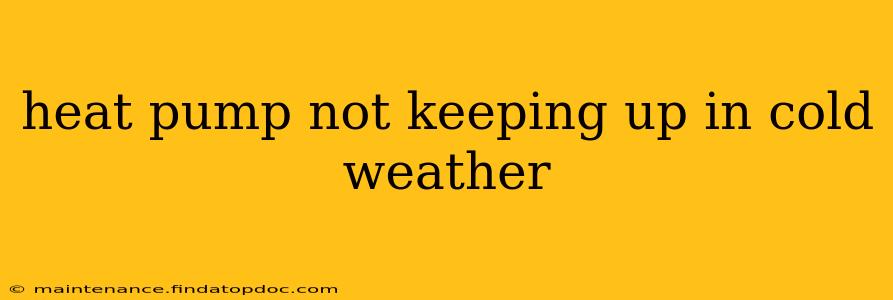Heat pumps are increasingly popular for their energy efficiency, but their performance can suffer in extremely cold weather. If your heat pump isn't keeping up in the cold, you're not alone. This comprehensive guide will explore the common reasons behind this issue and offer practical solutions to get your home warm and comfortable again.
Why Isn't My Heat Pump Working in Cold Weather?
This is the central question many homeowners face. Heat pumps work by moving heat, not generating it. In milder temperatures, this process is efficient. However, as temperatures plummet, the heat pump struggles to extract enough heat from the outside air to warm your home adequately. Several factors contribute to this decline in performance:
-
Low Outdoor Temperatures: The primary reason. Below a certain temperature (often around 25°F or -4°C, but this varies by model), the heat pump's efficiency significantly decreases. The colder the air, the less heat it contains.
-
Frozen Evaporator Coil: Ice buildup on the outdoor unit's evaporator coil restricts airflow and dramatically reduces heat transfer. This is a common problem in humid climates or when the unit isn't properly sized for your home.
-
Insufficient Refrigerant: A refrigerant leak can severely hamper the heat pump's ability to absorb and transfer heat. This requires professional attention.
-
Dirty Air Filter: A clogged air filter restricts airflow, reducing the heat pump's efficiency and potentially leading to freezing.
-
Improper Installation: A poorly installed heat pump may not function optimally, especially in extreme cold.
-
Defective Components: Malfunctioning parts, such as the compressor, fan motor, or reversing valve, can prevent the heat pump from working correctly.
How Can I Improve My Heat Pump's Performance in Cold Weather?
Addressing these issues requires a multi-pronged approach:
1. Regular Maintenance:
This is crucial for optimal performance year-round. Schedule annual maintenance checks with a qualified HVAC technician. This includes:
- Cleaning or replacing the air filter: Change your air filter every 1-3 months, or more frequently if necessary.
- Inspecting the coils for ice and debris: Clear any ice or debris from the outdoor unit's coils.
- Checking refrigerant levels: A technician can detect and repair refrigerant leaks.
2. Addressing Frozen Coils:
If your outdoor unit is frozen, do not attempt to defrost it with hot water or a hairdryer. This can damage the unit. Instead:
- Turn off the heat pump: Allow the unit to thaw naturally.
- Clear any obstructions: Ensure nothing is blocking airflow around the unit.
- Contact a professional: If the freezing persists, call an HVAC technician.
3. Optimizing Your Home's Insulation and Sealing:
Improve your home's energy efficiency by:
- Adding insulation: Proper insulation in your walls, attic, and floors minimizes heat loss.
- Sealing air leaks: Caulk and weatherstrip windows and doors to prevent drafts.
4. Using a Supplemental Heat Source:
Consider installing an electric resistance heater or a gas furnace as a backup heat source for extremely cold periods. Your heat pump may have an integrated electric resistance backup system.
5. Ensuring Proper Sizing:
A heat pump that is improperly sized for your home will struggle to keep up, especially in cold weather. Consult with an HVAC professional to ensure you have the right size unit for your home's square footage and climate.
What if My Heat Pump Still Isn't Working?
If you've tried these steps and your heat pump still isn't keeping up in cold weather, it's time to call a qualified HVAC technician. They can diagnose the problem accurately and perform necessary repairs or replacements.
How Often Should I Get My Heat Pump Serviced?
Getting your heat pump serviced annually is recommended to prevent costly repairs and ensure optimal efficiency. This preventative maintenance helps to catch small problems before they escalate into larger, more expensive issues.
Can I Prevent My Heat Pump From Freezing?
While completely preventing freezing isn't always possible, regular maintenance, proper insulation, and addressing any airflow obstructions significantly reduces the risk.
By following these tips and seeking professional help when needed, you can ensure your heat pump performs effectively even during the coldest winter months, keeping your home warm and comfortable.
